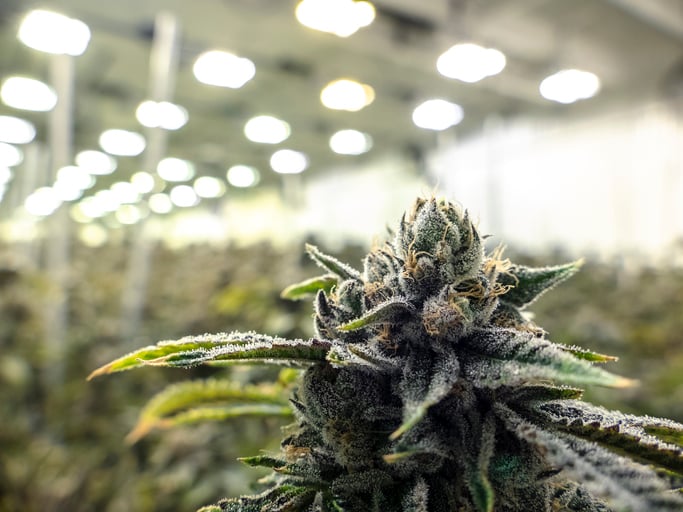This has been a transformational year for the cannabis industry, one that investors will possibly never forget. Although it's been a bit rough on the investment front, with the Horizons Marijuana Life Sciences ETF, a basket of more than four dozen pot stocks, losing approximately 40% of its value, 2018 has been a year of gained validity for the cannabis industry.
A year of legitimacy
To our north, Canada ended nine decades of recreational marijuana prohibition with the passage of the Cannabis Act in June, and the official legalization of adult-use weed on Oct. 17. Once the industry has had some time to ramp up production, it wouldn't be surprising if Canadian legal weed companies were generating up to $5 billion in added annual sales by the early part of the next decade.

Image source: Getty Images.
Within the U.S., despite the federal government holding firm on its belief that marijuana is a Schedule I drug, and therefore treated as an illicit substance, plenty of major advancements were made. Two new states (Utah and Missouri) voted to legalize medical pot, while Vermont and Michigan gave the green light to recreational weed. That's now 32 states that have approved medical cannabis in some capacity, 10 of which also allow adult consumption.
We also witnessed the Food and Drug Administration approve the very first cannabis-derived drug in June. Following a review by the Drug Enforcement Agency (DEA), GW Pharmaceuticals' Epidiolex was given the least restrictive classification possible (Schedule V).
Hemp! Hemp! Hooray!
But the biggest victory in U.S. cannabis history might just be the signing of the farm bill by President Trump this past Thursday, Dec. 20. The farm bill, interestingly enough, was championed by Sen. Mitch McConnell, a Republican from Kentucky, who last week rejected an amendment that would have allowed financial institutions to offer basic banking services to weed companies in the U.S. without the fear of criminal and/or financial penalties from the federal government.
The $867 billion farm bill is designed to provide billions of dollars in aid to farmers who've been hurt by the trade war between the U.S. and China. It notably legalizes the production and sales of industrial hemp and cannabidiol (CBD) derived from the hemp plant. CBD is the nonpsychoactive cannabinoid best known for its perceived medical benefits.

Image source: Official White House Photo by Shealah Craighead.
Hemp currently has a number of industrial uses in clothing, paper, paint, insulation, and animal feed. But it's the fact that the hemp plant has very little tetrahydrocannabinol (THC) -- the cannabinoid responsible for getting a user high -- and a high content of CBD that's so exciting. According to the Brightfield Group, the CBD market (this includes all types of CBD, not just from the hemp plant) is projected to grow by 147% per annum between 2018 and 2022, leading to a $22 billion market in a few short years. This, therefore, allows cannabis businesses to get their foot in the door nationally by producing and selling hemp-based CBD products.
To be clear, CBD from the cannabis plant is still classified as a regulated substance by the DEA. However, hemp is no longer to be associated with marijuana, and therefore hemp-based CBD isn't a controlled substance.
CBD glee
The legalization of hemp and hemp-based CBD is expected create substantial opportunities for a handful of publicly traded companies. Arguably at the top of that list is Canopy Growth (CGC 1.35%), the largest marijuana stock by market cap.
Although Canopy Growth CEO Bruce Linton has been very clear that the company has no intention of entering the U.S. cannabis market until there are changes made at the federal level, the company is in the process of buying ebbu for about $315 million (425 million Canadian dollars). Colorado-based ebbu is a hemp-research company that possesses intellectual property (IP) designed to help hemp farmers lower their growing costs and improve yields. With a major barrier to growth now gone, it would be logical to assume that ebbu's IP could become a hot commodity in the States. Canopy Growth is already planning to use this IP to cut costs and improve yields for its hemp grow farm in Saskatchewan.

Image source: Getty Images.
There's also the chance that Charlotte's Web Holdings (CWBHF +0.00%) receives a boost. Charlotte's Web currently sells CBD-based products (not limited to hemp-based CBD) in more than 3,000 retailers across the country. The legalization of hemp-based CBD should help normalize the product and could easily expand the company's hemp-based offerings into more retailers. Considering that Charlotte's Web is already profitable on a recurring basis, shareholders have to be pleased with the farm bill's passage into law.
Florida-based vertically integrated dispensary Liberty Health Sciences (LHSIF +0.00%) also plans to get in on the act. The company announced on Thursday, Dec. 20, that it plans to launch a line of hemp-derived CBD products, known as Zentient Labs. Liberty Health Sciences has about a dozen locations open or planned in Florida, with the expectation of 225,000 square feet of aggregate grow space by early 2019. Given that Florida could be one of America's billion-dollar medical cannabis markets, the move makes sense for Liberty Health.
There's a possible downside for investors, too
However, the legalization of hemp in the U.S. may not be as welcome to the marijuana industry as you might think.

Image source: Getty Images.
Vertically integrated dispensaries have gone through the arduous process of being licensed for retail and cultivation in order to be the exclusive suppliers of cannabis-based products, including CBD products, in states where they are legal. With the passage of the farm bill, it now becomes possible for virtually any business to cultivate and distribute hemp-based CBD products, which could draw away both foot traffic and revenue for licensed dispensaries. To be clear, vertically integrated dispensaries will still offer a broader line of products, including cannabis-derived CBD in select states. But their perceived exclusivity on CBD products has now been compromised, and it may show as an adverse impact in their sales or profit potential.
It'll certainly be interesting to see how the U.S. and Canadian cannabis industries respond to the new farm bill.






